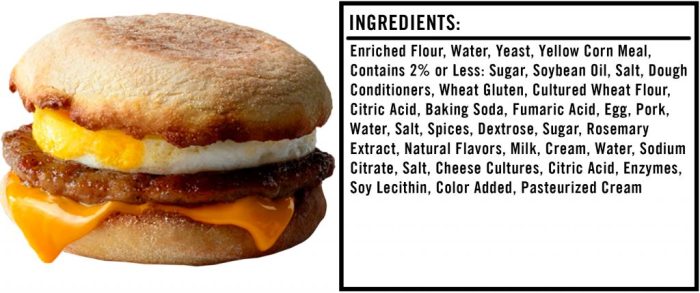Comparison to Similar Breakfast Items: Sausage Egg Mcmuffin Nutrition Facts

Sausage egg mcmuffin nutrition facts – The Sausage Egg McMuffin, while a convenient and familiar breakfast option, isn’t alone in the fast-food breakfast sandwich arena. A direct comparison to similar offerings from McDonald’s reveals important nutritional differences that consumers should consider when making choices about their morning meal. Understanding these variations allows for more informed decisions regarding calorie intake, fat consumption, and protein levels.The following table provides a direct nutritional comparison of the Sausage Egg McMuffin with other popular McDonald’s breakfast sandwiches.
Note that nutritional information can vary slightly depending on location and preparation methods. Always refer to the most up-to-date information provided directly by McDonald’s.
Nutritional Comparison of McDonald’s Breakfast Sandwiches
| Item | Calories | Total Fat (g) | Protein (g) |
|---|---|---|---|
| Sausage Egg McMuffin | 390 | 23 | 14 |
| Bacon, Egg & Cheese Biscuit | 460 | 26 | 19 |
| Steak, Egg & Cheese Biscuit | 500 | 29 | 20 |
Visual Comparison of Portion Sizes
Imagine two images side-by-side. On the left, a Sausage Egg McMuffin sits in its paper wrapper. It’s compact, roughly 4 inches in diameter, with a relatively flat profile. The English muffin is clearly visible, slightly browned, cradling a fried egg and a sausage patty. The overall impression is one of efficiency and portability.
On the right, a homemade breakfast sandwich is presented. This sandwich is noticeably larger, perhaps 6 inches in diameter, and considerably thicker. The bread might be a toasted croissant or a larger, fluffier bun. The egg could be larger and possibly cooked differently, perhaps scrambled or over-easy. The sausage patty might be significantly larger or even replaced by bacon or ham.
The fillings may be more substantial, potentially including cheese slices or additional vegetables like spinach or tomato. This visual comparison highlights the considerable difference in size and potential nutritional content between a fast-food option and a homemade alternative. The homemade sandwich visually represents a potentially larger serving size and a greater volume of ingredients.
Dietary Considerations

The Sausage Egg McMuffin, while a convenient breakfast option, presents several dietary challenges depending on individual needs and health goals. Its suitability varies significantly across different dietary approaches, and understanding its nutritional profile is crucial for informed consumption. Ignoring its inherent limitations can lead to negative health consequences for certain individuals.The Sausage Egg McMuffin’s high saturated fat and sodium content are significant concerns.
Its relatively high calorie count also needs consideration for those managing their weight.
Understanding the nutritional breakdown of a Sausage Egg McMuffin, including its calorie and fat content, is crucial for mindful eating. Comparing this to other common condiments, such as the calorie count found in caesar dressing nutrition facts calories , highlights the significant differences in caloric density. Returning to the McMuffin, consider its sodium content alongside the overall nutritional profile before making dietary choices.
Suitability for Various Diets
The Sausage Egg McMuffin is demonstrably unsuitable for many restrictive diets. Its ingredients directly contradict the principles of several popular dietary plans. For example, the presence of sausage and egg renders it wholly inappropriate for vegans and vegetarians. The relatively high carbohydrate content from the English muffin also makes it less than ideal for strict low-carbohydrate diets like keto.
While the egg and sausage provide protein, the overall macronutrient balance isn’t optimal for a purely high-protein diet focusing on lean sources. Individuals following these diets should seek alternative breakfast options that better align with their specific macronutrient targets.
Impact on Cholesterol and Blood Sugar
The Sausage Egg McMuffin’s saturated fat content significantly impacts cholesterol levels. Saturated fats raise LDL (“bad”) cholesterol, increasing the risk of heart disease. The relatively high amount of saturated fat in the sausage, coupled with the yolk in the egg, poses a risk for individuals with high cholesterol or a family history of heart disease. Similarly, the refined carbohydrates in the English muffin can lead to a rapid spike in blood sugar levels, potentially problematic for individuals with diabetes or insulin resistance.
This rapid increase in blood sugar can lead to energy crashes later in the morning.
Incorporating the Sausage Egg McMuffin into a Balanced Diet, Sausage egg mcmuffin nutrition facts
Incorporating the Sausage Egg McMuffin into a balanced diet requires careful consideration and moderation. It should not be a daily staple but rather an occasional treat. To mitigate some of its negative impacts, pairing it with a side of fresh fruit or vegetables can help improve the overall nutritional balance. Choosing a smaller portion size or opting for a reduced-fat version of the sausage, if available, can also slightly reduce the negative health impacts.
However, even with these modifications, the inherent limitations remain.
Healthier Alternatives and Modifications
Numerous healthier alternatives exist for those seeking a quick and convenient breakfast. Oatmeal with berries and nuts provides a balanced source of fiber, protein, and complex carbohydrates. Greek yogurt with fruit and granola offers a high-protein option. Scrambled eggs with whole-wheat toast and avocado provide a healthier fat profile. For a modified Sausage Egg McMuffin, consider using a whole-wheat English muffin, substituting the sausage with turkey bacon or a plant-based alternative, and using only egg whites to reduce cholesterol.
These adjustments reduce the overall negative health impact, but complete avoidance is often the best option for individuals with specific dietary restrictions or health concerns.
Sodium and Fat Content

The Sausage Egg McMuffin, while a convenient and tasty breakfast option, presents a significant challenge for those watching their sodium and fat intake. Its high levels of both can contribute to various health concerns if consumed regularly without mindful consideration. Understanding the specifics of its nutritional profile is crucial for making informed dietary choices.The Sausage Egg McMuffin contains a considerable amount of sodium, often exceeding 700mg per serving.
This represents a substantial portion of the recommended daily intake of sodium, which is typically set at 2300mg or less, and ideally closer to 1500mg for many adults to reduce the risk of high blood pressure and related cardiovascular diseases. Excessive sodium consumption is linked to hypertension, increasing the risk of stroke, heart attack, and kidney disease. The high sodium content in the Sausage Egg McMuffin is primarily attributed to the processed sausage and the salt used in its preparation.
Fat Content Breakdown
The Sausage Egg McMuffin contains a mixture of saturated, unsaturated, and (hopefully minimal) trans fats. Saturated fats, found primarily in the sausage and egg yolk, raise LDL (“bad”) cholesterol levels, increasing the risk of heart disease. Unsaturated fats, while generally considered healthier, should still be consumed in moderation. Trans fats, artificially created during food processing, are particularly detrimental to health, raising LDL cholesterol and lowering HDL (“good”) cholesterol.
While McDonald’s strives to minimize trans fats, it’s important to be aware of their potential presence in processed foods like sausage. The overall fat content contributes significantly to the high caloric density of the Sausage Egg McMuffin.
Comparison to Recommended Daily Intakes
A single Sausage Egg McMuffin often contains a significant percentage of the recommended daily intake of both sodium and total fat, particularly saturated fat. For example, if the recommended daily sodium intake is 2300mg, a single McMuffin can contribute over 30% of this in one meal. Similarly, the saturated fat content might easily represent a substantial portion of the recommended daily limit, which varies depending on individual dietary needs and overall calorie intake.
The high levels necessitate careful consideration within the context of a balanced daily diet.
Strategies for Reducing Sodium and Fat Intake
It’s important to remember that occasional indulgence is fine, but regular consumption of a Sausage Egg McMuffin without modification increases the risk of health issues. To mitigate the impact of its high sodium and fat content:
- Choose a smaller breakfast option or share a McMuffin with someone.
- Opt for egg-white based alternatives to reduce the saturated fat from the yolk.
- Select a lower-sodium sausage option if available or consider substituting with a healthier protein source such as turkey bacon or a whole-wheat English muffin with avocado and egg.
- Balance the meal with nutrient-rich sides, like a fruit salad, to offset the sodium and fat.
- Be mindful of overall daily intake. If you consume a Sausage Egg McMuffin, make conscious choices to reduce sodium and fat in other meals throughout the day.
Popular Questions
Can I customize a Sausage Egg McMuffin to make it healthier?
Yes, you can request modifications such as removing the cheese or opting for a different type of sausage. You can also add healthier sides, such as fruit.
How does the Sausage Egg McMuffin compare to other fast-food breakfast sandwiches?
Nutritional values vary considerably across brands and specific items. A direct comparison requires analyzing the nutritional information for each specific sandwich being considered.
Is the Sausage Egg McMuffin suitable for people with heart conditions?
Due to its high saturated fat and sodium content, individuals with heart conditions should consult their doctor or a registered dietitian before regularly consuming Sausage Egg McMuffins.
What are the potential long-term health effects of regularly eating Sausage Egg McMuffins?
Regular consumption of high-sodium, high-saturated fat foods like the Sausage Egg McMuffin may increase the risk of heart disease, high cholesterol, and weight gain over time. A balanced diet is key.

